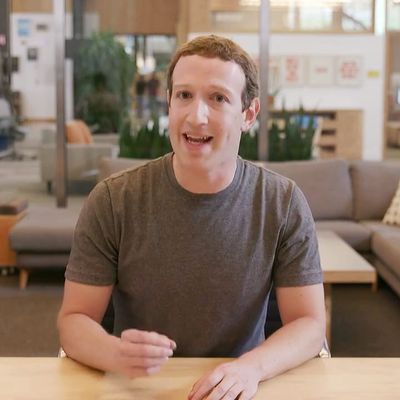
I just went live a minute ago. Here’s what I said:
Recently, many of you in the community have expressed concerns over [INCIDENT]. Some of you don’t think that Facebook and the users who rely on our platform should be able to [PRIVACY-RELATED VERB]. Let me say this: We hear you.
At its best, Facebook has always been about forging connections between you and your friends and third-party data brokers. Facebook is powered by data. In a sense, Facebook is powered by you: the community.
I’d like to clear up how Facebook works and what we do in service of building global community. Some have said that this most recent incident, which we knew about [WHEN WE ACTUALLY KNEW], is “[PHRASING WE DON’T LIKE].” I want to be clear: It is not. This happened in accordance with Facebook’s official policies, and so by definition, it was not wrong to do, and in fact the right thing for us to do. Also, we changed those policies, but not because they were wrong.
Our community of millions of developers is one of the most important communities I can think of, and I know a lot of communities.
This is a difficult problem to solve for many reasons. When I traveled the country last year, speaking with working Americans, and angling myself to look taller than most of them in photos, I learned that some were concerned with [ISSUE]. Others told me that they wanted to see [OPPOSITE SIDE OF DIFFERENT ISSUE]. Facebook should be a platform for all ideas, whether that’s securing data or not securing it. Facebook is about giving everyone the power to share their experience, as well as age, city of birth, alma mater, and favorite Jersey Shore cast member. You can’t spell community without common, almost.
At Facebook, we feel a responsibility to make sure our services are fun to use, and that you think using Facebook is time well spent. I’ll admit that [INCIDENT] did not help us live up to our values of [TRUST | COMMUNITY | CONSTANT SURVEILLANCE — CHOOSE ONE]. The most important thing Facebook can do is help us connect with each other and brands. Facebook has always been about bringing people together, both on our own servers and many others we don’t even know about. As I learned on my travels last year, community is [USE DOWN-HOME PHRASE MEANING “IMPORTANT” HERE] to us at Facebook.
Still, we know we can do better. Today, I want to share the steps we’re taking to [THING YOU ASSUMED WE WERE DOING ALL ALONG]:
(1) We’re going to think really hard. This is probably the toughest part of my job, but I take it very seriously. There will be a lot of brainstorms and writing on glass this year.
(2) We will call [PEOPLE WHO USE OUR PLATFORM AS INTENDED] and ask them if they are behaving themselves. If they say yes, we will ask, “Are you sure?” and if they say yes again, we will say “Promise?” This approach is key to maintaining fairness on the platform for all ideas.
(3) We will not notify any user who was affected by [THE PEOPLE WHO USE OUR PLATFORM AS INTENDED].
Now, I wish I could tell you we’re going to be able to stop all [BAD THING], but that wouldn’t be realistic. There will always be not-so-good people in the world, and pobody’s nerfect. But we can make it harder for [PEOPLE WHO USE OUR PLATFORM AS INTENDED] to [ACT THAT USES PLATFORM AS INTENDED]. Maybe we will do this. In the end, it all comes down to the community.
Previous uses of this apology format: “Oops, I dismissed concerns of election interference”; “Let’s hear Peter Thiel out”





























